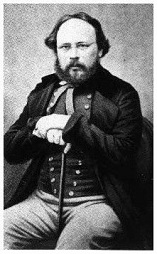Our Pierre-Joseph Proudhon: Property is Theft
Patrick Mac Manus
Patrick Mac Manus Blog

“To be governed is to be watched over, inspected, spied on, directed, legislated at, regulated, docketed, indoctrinated, preached at, controlled, assessed, weighed, censored, ordered about, by men who have neither the right, nor the knowledge, nor the virtue. … To be gover…ned is to be at every operation, at every transaction, noted, registered, enrolled, taxed, stamped, measured, numbered, assessed, licensed, authorized, admonished, forbidden, reformed, corrected, punished. It is, under the pretext of public utility, and in the name of the general interest, to be placed under contribution, trained, ransomed, exploited, monopolized, extorted, squeezed, mystified, robbed; then, at the slightest resistance, the first word of complaint, to be repressed, fined, despised, harassed, tracked, abused, clubbed, disarmed, choked, imprisoned, judged, condemned, shot, deported, sacrificed, sold, betrayed; and, to crown all, mocked, ridiculed, outraged, dishonoured. That is government; that is its justice; that is its morality…” ~ Idée Générale de la Révolution au XIXe Siècle [The General Idea of the Revolution] (1851); quoted in The Anarchists (1964) by James Joll, Ch. 3, p. 78
“I stand ready to negotiate, but I want no part of laws: I acknowledge none; I protest against every order with which some authority may feel pleased on the basis of some alleged necessity to over-rule my free will. Laws: We know what they are, and what they are worth! They are spider webs for the rich and mighty, steel chains for the poor and weak, fishing nets in the hands of government…” ~ “The Authority Principle” in No Gods, No Masters : An Anthology of Anarchism (1980) Daniel Guérin, as translated by Paul Sharkey (1998), p. 90
Some Details
Pierre-Joseph Proudhon, the son of a brewer, is born in Besancon, France, in 1809. He attends the local school but is primarily self-educated at the town’s public library.
Proudhon is apprenticed as a printer and becomes interested in politics after being involved in the printing of ‘The New Industrial and Cooperative World’ by Charles Fourier.
Proudhon turns to writing and in 1840 publishes ‘What is Property?’ He attacks the injustices of inequality and coins the phrase, “Property is theft”. He contrasts the right of property with the rights of liberty, equality, and security, saying:
“The liberty and security of the rich do not suffer from the liberty and security of the poor; far from that, they mutually strengthen and sustain each other. The rich man’s right of property, on the contrary, has to be continually defended against the poor man’s desire for property.”
In 1842 Proudhon is arrested for his radical political views but is acquitted in court. The following year he joins the Lyons Mutualists, a secret society of working men. The group discusses ways of achieving a more egalitarian society and during this period Proudhon develops the theory of Mutualism where small groups work together and credit was made available through a People’s Bank.
After the 1848 French Revolution in France, Proudhon is elected to the National Assembly. This experience results in the publication of ‘Confessions of a Revolutionary’ (1849) and the ‘General Idea of the Revolution in the 19th Century‘ (1851). In these books Proudhon criticizes representative democracy and argued that in reality political authority is exercised by only a small number of people.
Pierre-Joseph Proudhon’s views have a profound effect on writers in Russia including Alexander Herzen, Peter Lavrov, Peter Kropotkin and Leo Tolstoy.
Our Pierre-Joseph Proudhon leaves us in 1865.
___________________________________________________________________________________
More Information: http://en.wikipedia.org/wiki/Pierre-Joseph_Proudhon
URL: http://www.a-w-i-p.com/index.php/2010/12/05/our-pierre-joseph-proudhon-property-is-t
























